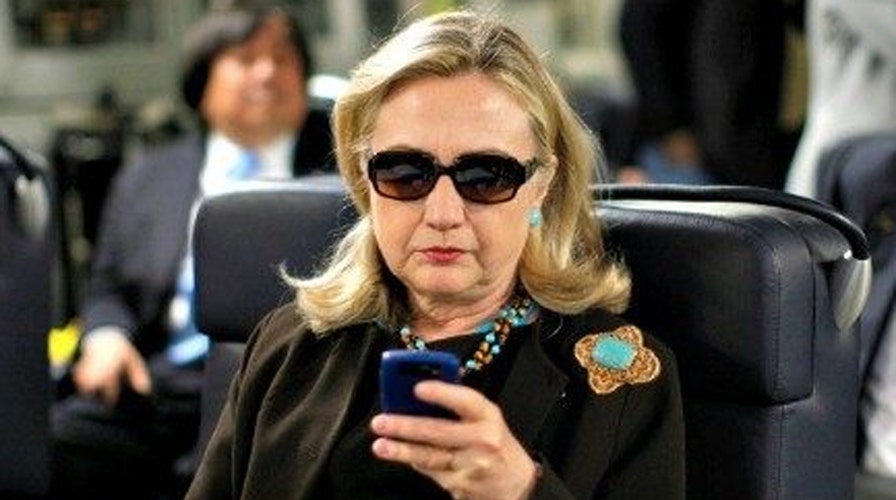White House: Clinton email probe a 'criminal investigation'
Strategy Room: Leslie Marshall and Liz Peek react to Earnest's use of the term 'criminal investigation,' which goes against Hillary Clinton's claim that the probe is merely an 'inquiry'
Long-time Hillary Clinton aide Huma Abedin said under oath Tuesday that Clinton as secretary of state didn’t want emails sent and received on her private computer server to be accessible to "anybody,” and suggested the unusual communication setup created problems --including a potential hacking incident and missing at least one important message.
Her deposition to lawyers for the conservative group Judicial Watch provided new insights into the highly unusual decision by Clinton, the presumptive Democratic presidential nominee, to have a private email server in her basement for private and official department communications.
Abedin is one of several former State Department officials who are being deposed by the group in a civil lawsuit over the agency's failure to turn over files under the Freedom of Information Act.
A transcript of the proceeding was released by Judicial Watch on Wednesday.
"Judicial Watch represents everything that is wrong with our political system," Clinton spokesman Nick Merrill said after the release. "Manufacturing wrongdoing has been central to their singular agenda since their inception. Worse, they do this by clogging up the courts at the expense of tens of millions of tax-payer dollars. ... They are only interested in headlines and have made a complete mockery of our system. And if you want proof, just look at this latest round of leaks that are contradicted by their own transcripts. It's truly disgraceful."
Abedin also said Wednesday the she didn’t know whether Clinton personally deleted any emails during her tenure as secretary.
Abedin, now working on the Clinton campaign, told lawyers in the nearly 6-hour-long deposition that she could not recall whether she or Clinton discussed with any State Department officials Clinton's use of her server exclusively for government business.
Abedin said she and Clinton used a private email accounts -- HDR22@Clintonemail.com and Huma@Clintonemail.com -- for government business, in part when the State Department server was down.
"I assumed it was OK to do," she said. “I didn't really think about the server until all the press reports in the last year-and-a-half came out.”
Judicial Watch lawyers repeatedly pressed Abedin to explain Clinton's concern expressed to her in a November 2010 message that her emails might become public, but the longtime aide insisted that Clinton's interest in wanting to keep her correspondence from being exposed was similar to any private citizen's.
"I would imagine anybody who has personal email doesn't want that personal email to be read by anybody else," Abedin explained. "I read it the same way as she has written it."
Clinton's emails contained tens of thousands of work-related emails as well as private messages, and she turned over nearly 33,000 business-related messages while retaining and deleting about the same number of messages. Among the emails she did not turn over was a November 2010 email discussing her concerns about the risk of the personal being “accessible."
The deposition also raised questions about the State Department's practices responding to government records requests under the U.S. Freedom of Information Act.
Abedin said she never searched or was asked to search for documents in her State Department or her private Clinton email accounts in response to requests or lawsuits under the open records law.
But a review of all requests to the State Department during that period found several asking specifically for copies of Abedin's emails on a variety of subjects, including her husband, one-time disgraced Rep. Anthony Weiner.
It was not immediately clear how the State Department could have complied with such legal requests for Abedin's emails without asking Abedin to search her messages.
Some federal agencies permit full-time FOIA staffers to search the inboxes of senior government officials, but many agencies expect officials to search their own accounts and no U.S. employee presumably would have had access to Abedin's personal account on Clinton's private server. Abedin said she was not aware that anyone else searched her accounts, either.
Abedin acknowledged to the lawyers an incident in which she stopped getting emails on her @Clintonemail account so she called agency IT employee Justin Cooper who said he suspected somebody was trying to “hack us.”
She also acknowledged then sending messages that read: “Don't e-mail HRC anything sensitive,” and “I can explain more in person."
Abedin told the lawyers: “Honestly, I wish I thought about it at the time. As I said, I wasn't perfect. I tried to do all of my work on (my) State.gov. (email). And I do believe I did the majority of my work on State.gov.”
Abedin also said that Clinton’s use of private email for government business got in the way of her work at least once.
Abedin said she and Clinton were “frustrated” by one particular incident, in 2010, in which a missed email resulted in the secretary missing a phone call with a foreign minister.
In a blistering audit released last month, the State Department's inspector general concluded Clinton and her team ignored clear internal guidance that her email setup violated federal records-keeping standards and could have left sensitive material vulnerable to hackers.
The audit also cited a then-unreleased copy of a November 2010 email Clinton sent Abedin in which the secretary discussed using a government email account, expressing concern that she didn't want "any risk of the personal being accessible."
The Judicial Watch deposition comes after the same group brought in Clinton IT specialist Bryan Pagliano -- who invoked the Fifth more than 125 times during a 90-minute, closed-door session.
Unlike Pagliano, Abedin answered questions. They were deposed as part of Judicial Watch's lawsuit seeking Clinton emails and other records.
The Associated Press contributed to this report.





